|
|
|
Sort Order |
|
|
|
Items / Page
|
|
|
|
|
|
|
| Srl | Item |
| 1 |
ID:
121133
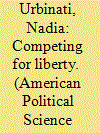

|
|
|
|
|
| Publication |
2012.
|
| Summary/Abstract |
Freedom as non-domination has acquired a leading status in political science. As a consequence of its success, neo-roman republicanism also has achieved great prominence as the political tradition that delivered it. Yet despite the fact that liberty in the Roman mode was forged not only in direct confrontation with monarchy but against democracy as well, the relationship of republicanism to democracy is the great absentee in the contemporary debate on non-domination. This article brings that relationship back into view in both historical and conceptual terms. It illustrates the misrepresentations of democracy in the Roman tradition and shows how these undergirded the theory of liberty as non-domination as a counter to political equality as a claim to taking part in imperium. In so doing it brings to the fore the "liberty side" of democratic citizenship as the equal rights of all citizens to exercise their political rights, in direct or indirect form.
|
|
|
|
|
|
|
|
|
|
|
|
|
|
|
|
| 2 |
ID:
101111
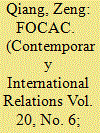

|
|
|
| 3 |
ID:
074330
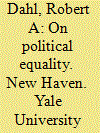

|
|
|
|
|
| Publication |
New Haven, Yale University Press, 2006.
|
| Description |
xii, 142p.
|
| Standard Number |
0300116071
|
|
|
|
|
|
|
|
|
|
|
|
Copies: C:1/I:0,R:0,Q:0
Circulation
| Accession# | Call# | Current Location | Status | Policy | Location |
| 051839 | 323.5/DAH 051839 | Main | On Shelf | General | |
|
|
|
|
| 4 |
ID:
121052
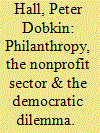

|
|
|
|
|
| Publication |
2013.
|
| Summary/Abstract |
The central dilemma of American democracy is the tension between "voice" and "equality": between the Constitution's unconditional guarantees of citizens' expressive, associational, and property rights and the legal and political equality that is the foundation of majoritarian decision-making. Philanthropy and nonprofit organizations - which enable citizens to give money and time to support causes in which they believe - have posed this dilemma with unusual force, allowing moneyed minorities to oppose and sometimes overwhelm the popular will. In the past, these assertions of private power have inevitably aroused popular opposition producing legislative and regulatory outcomes that have maintained a balance between voice and equality. Today, with unprecedented accumulations of wealth and legal changes permitting the unrestricted use of wealth in politics, the unchallenged exercise of private power through philanthropy and the nonprofit sector poses grave threats to the democratic process.
|
|
|
|
|
|
|
|
|
|
|
|
|
|
|
|
| 5 |
ID:
039025


|
|
|
|
|
| Publication |
Princeton, Princeton University Press, 1988.
|
| Description |
xvii, 253p.
|
| Standard Number |
0691077916
|
|
|
|
|
|
|
|
|
|
|
|
Copies: C:1/I:0,R:0,Q:0
Circulation
| Accession# | Call# | Current Location | Status | Policy | Location |
| 032317 | 321.8/BET 032317 | Main | On Shelf | General | |
|
|
|
|
| 6 |
ID:
181542
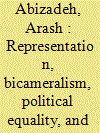

|
|
|
|
|
| Summary/Abstract |
The two traditional justifications for bicameralism are that a second legislative chamber serves a legislative-review function (enhancing the quality of legislation) and a balancing function (checking concentrated power and protecting minorities). I furnish here a third justification for bicameralism, with one elected chamber and the second selected by lot, as an institutional compromise between contradictory imperatives facing representative democracy: elections are a mechanism of people’s political agency and of accountability, but run counter to political equality and impartiality, and are insufficient for satisfactory responsiveness; sortition is a mechanism for equality and impartiality, and of enhancing responsiveness, but not of people’s political agency or of holding representatives accountable. Whereas the two traditional justifications initially grew out of anti-egalitarian premises (about the need for elite wisdom and to protect the elite few against the many), the justification advanced here is grounded in egalitarian premises about the need to protect state institutions from capture by the powerful few and to treat all subjects as political equals. Reflecting the “political” turn in political theory, I embed this general argument within the institutional context of Canadian parliamentary federalism, arguing that Canada’s Senate ought to be reconstituted as a randomly selected citizen assembly.
|
|
|
|
|
|
|
|
|
|
|
|
|
|
|
|
| 7 |
ID:
130516
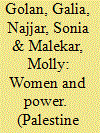

|
|
|
|
|
| Publication |
2011.
|
| Summary/Abstract |
Golan: I think we all agree that we need to find ways that women can be more power full, and this can be anywhere from economic freedom in the household all the way up to participation in decision-making. The question is: What are the best ways to do this'? I think economic independence is one way in which women can begin to assert themselves and be able to at least stand on their own. not necessarily in terms of acting independently outside the home or on their own, but rather in terms of being able to be a full person. vis-a-\='is the other people within the household, whether a husband or a brother or a Father. It begins there, and then we must look for ways to extend this so that women may have an actual role in decision-making. starting from the home and continuing all the way up to government.
Najjar: I would completely agree with you if this were under normal circumstances, perhaps under a real democracy. My concern is more in terms of wait has been happening in an environment of ongoing occupation and annexation. Whereas the household is a very important component. the largest component is that women are continuously living under a paradigm of oppression and lack any forms ourself determination, access, mobility, freedom of expression. identity or cultural activity. There is a little bit of leeway here and there, but I do not see how women can reach any type
|
|
|
|
|
|
|
|
|
|
|
|
|
|
|
|
|
|
|
|
|